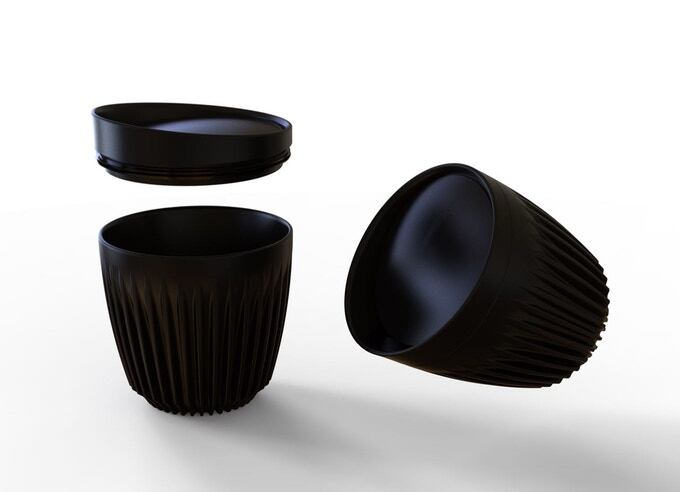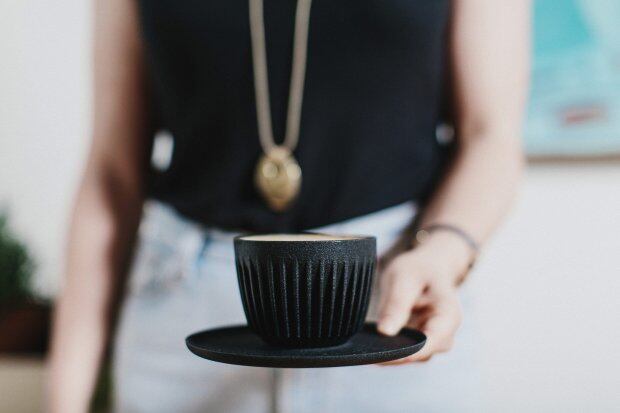The idea for HuskeeCup came from the problem surrounding waste disposal from coffee processing and it is expected to be available from February 2018.
Five-man team

The team behind the brand is made up of Saxon Wright, part-owner of coffee brand Pablo and Rusty's, Joshua Jagelman, coffee grower and director, Yunnan Coffee Traders, Nicole Barnes, operations guru and IP navigator and manufacturing authority Adrian Chen and Michael Chin.
Wright, co-founder, HuskeeCup, said Pablo and Rusty's sources its husk from coffee farms in China's Yunnan Provence, a specialty coffee region where members of his team have been working in partnership with local farmers for the last decade.
But as demand for HuskeeCup increases, he expects the network of farms will have to increase regionally and then internationally.
At the end of the harvest, coffee farmers manage hundreds of tonnes of husk waste where it has previously been used as a fertilizer supplement and carbonized fuel source.
"We wanted to create a closed-loop system, so we thought if we could use waste from farming to create a cup we could solve problems both at the cafe and farm level," said Wright.
“Our coffee partners in Yunnan, along with us, have always sought to create zero waste from the production to consumption of coffee, eliminating waste from the supply chain.
“The farmers were trying to solve the husk problem, asking what do we do with millions of tonnes of this raw material, and we were trying to solve the design aspects and sustainability issues around modern commercial ceramics.”
Responsible Cafes initiative
Annually 1.35 million tonnes of husk waste is generated globally, while the average coffee drinker contributes about three kilograms of husk waste every year.
The City of Sydney has launched a $25k funding to support the Responsible Cafes initiative, a collective of "coffee drinkers and cafe owners" working towards reducing the use of single-use disposable coffee cups.
“HuskeeCup aims to rethink what a cup can be” added Wright, “It’s a cup made from the waste material created by the production of coffee at farm level.
“Husk is hulled off in the drying stage and is typically discarded or burned. We have taken this material and turned it into something functional – a sustainable alternative to ceramics for cafés.”
However the design was not without its challenges such as the thermal qualities of the cup during production because it has no handle.
“We have learnt off various experts in parallel fields, industrial designers, molding and polymer experts,” said Wright.
“We sought input from all potential users, like baristas, waiters and end customers. However, all new problems can be solved if you go back to first principles, have a creative process and team, have an open mind and a willingness to learn from everyone around you.”
CO2-capturing microbes
The team is already working on an more eco-friendly version of the cup.
“We have been researching all kinds of polymers – we want to use CO2-capturing microbes to produce our base bio-polymer to blend with our husk,” said Wright.

“There is a lot of testing and trial and error. The challenge is using as much husk as possible, whilst preserving all the characteristics of the design intent and useful qualities.”
Huskee works closely with its husk suppliers to ensure no hazardous chemicals are used during the process to obtain the husks.
The final products will go through laboratory testing and approval with certifying bodies for FDA approval and other internationally recognized certifications to ensure the product is food safe.
Third party studies show that husk materials have higher elasticity and lower crystallinity than ceramics, which suggests better durability and crack resistance.
The final product, which comes in a range of sizes 6oz, 8oz and 12oz, will have a coffee husk percentage that ensures the optimal balance between durability and performance in a home, office or cafe environment.
